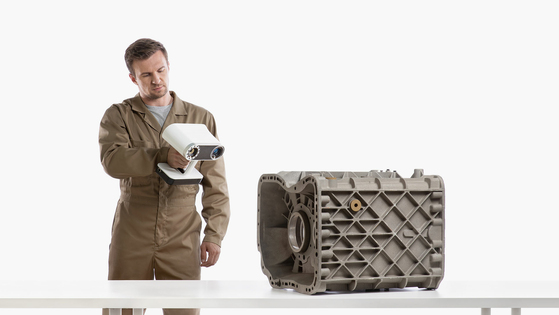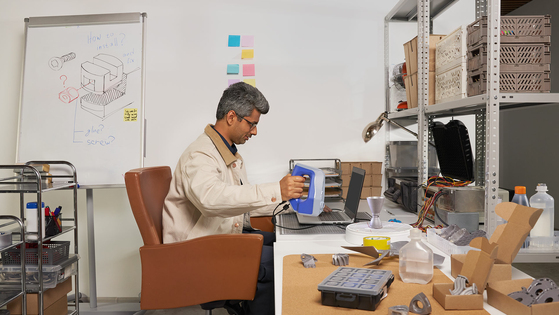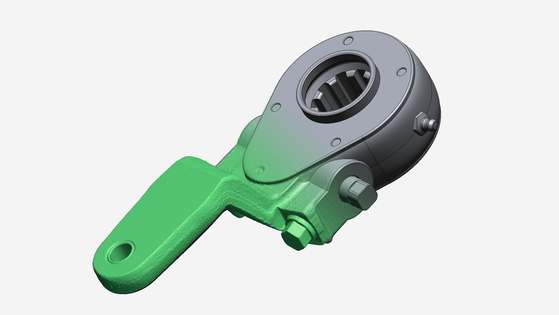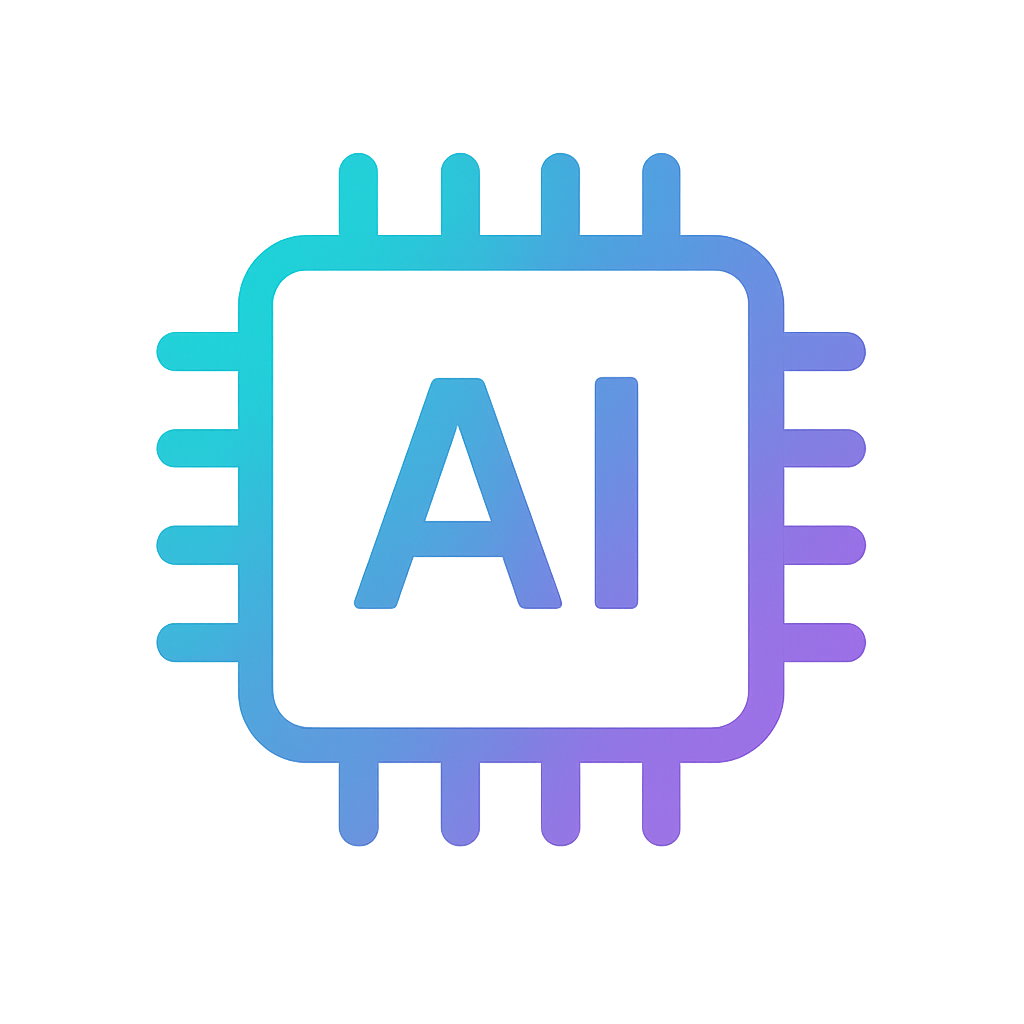Best 3D modeling software in 2024
Summary
Looking for a career in 3D modeling? Or perhaps you’re on a hunt for new software to add to your 3D design workflow? Well, you’re in for a treat. We’ve selected the best modeling and animation software to suit every taste and pocket. Whether you’re already a master in 3D modeling or are just starting out, we’ve got some amazing software for you to check out.
Introduction
If you’ve read our article on how to make 3D models, you already know that there are various ways to create them. The main two methods include designing something from scratch using specialized 3D software, or creating a 3D model of an existing object, person, or scene by capturing it with a 3D scanner. Either on their own or together, both ways are widely used by professionals in various fields from industrial design and manufacturing to gaming, movies and animation, architecture, fashion, healthcare, and many others.
In this article, we’ll take a look at the best free and paid 3D modeling software suitable for both beginners and pros, and help you choose the one that best suits your needs and skills. For this review, we will be focusing on tools for polygonal modeling and digital sculpting with 3D scan data. Engineering, building design, architecture, and other CAD-related software will be reviewed separately in our Best CAD software guide.
Best paid 3D modeling software
Autodesk Maya
Cost
US $235/month
US $1,875/year
US $5,625/3-yearsOS
Windows, macOS, Linux
Pros
Easy to use, extensive features
Cons
Relatively expensive
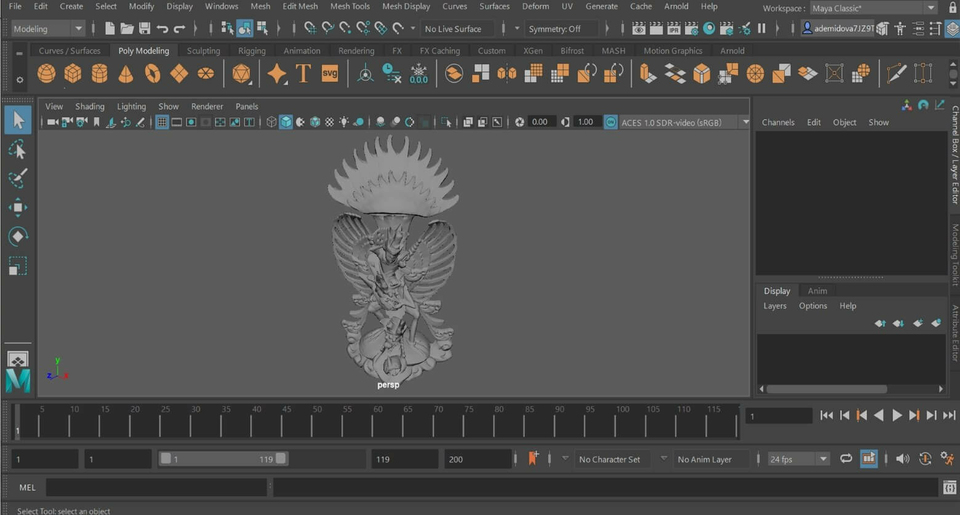
If you already have decent experience with basic 3D design software and are looking to refine your skills, Autodesk Maya is an excellent next step in your 3D modeling journey. Developed in the 1990s, Maya is an Academy Award-winning 3D design software for character creation, animation, rigging, simulation, and rendering. The software is highly popular among VFX and animation studios, and is behind many of the biggest blockbuster movies and animations ever created.
The reason why so many VFX artists love Maya stems from its extensive set of modeling, texturing, rendering, and animation tools which can be adjusted based on one’s particular design process. Dynamics in Maya can be applied to objects using rigid-body or soft-body settings, cloth and particle simulations, character modeling and animation, UV editing, hair grooming tools, and more.
For the very same reason, many new users find Maya's interface overwhelming at first; there’s definitely a learning curve before you can master this software. But, if you're looking for a robust 3D modeling tool, Maya won’t disappoint. There is a large community of users with whom you can connect, as well as lots of video tutorials to watch and learn from. The tool comes with a monthly or yearly subscription and a 30-day money back guarantee.
A powerful software suite for professional 3D modelers to create assets for interactive 3D applications (including video games), animated films, TV series, and visual effects.
Autodesk 3ds Max
Cost
US $235/month
US $1,875/year
US $5,625/3-yearsOS
Windows
Pros
Easy to use, extensive features
Cons
Windows only, relatively expensive
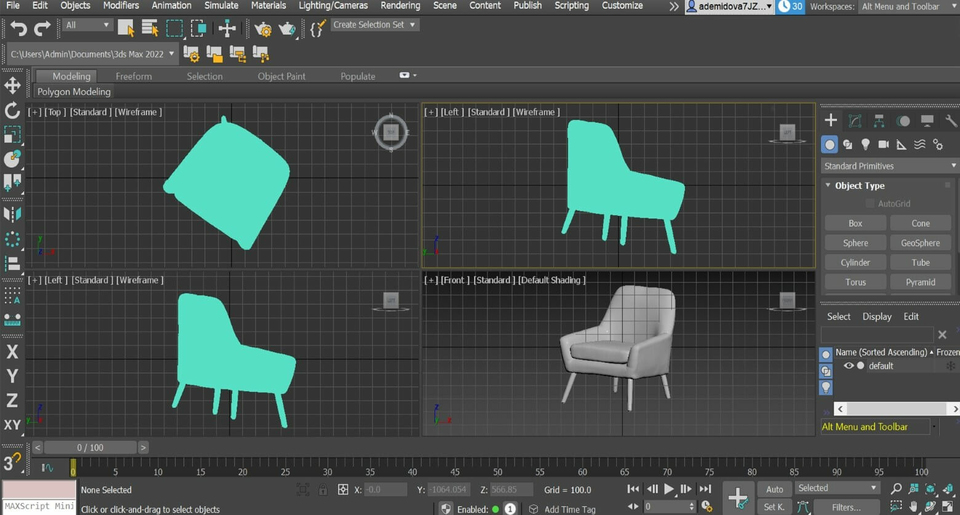
Another popular solution from the same software family is Autodesk 3ds Max – a great choice if you’re looking for a beginner-level yet professional 3D modeling solution. Designed only for Windows, 3dx Max provides a comprehensive modeling, animation, simulation, and rendering package for design visualization, architecture, games, films, and animation.
Users choose 3dx Max for its simplicity and ease of use, which is why the learning curve is fairly gradual compared to Maya. Despite its relative ease of use, you'll be hard-pressed to find any other 3D modeling software with as many video tutorials, online courses, and third-party extensions. This is why it’s amazing software if you’re just getting started with 3D modeling!
ZBrush
Cost
US $39/month
OS
Windows, macOS
Pros
Robust sculpting tools
Cons
Steep learning curve
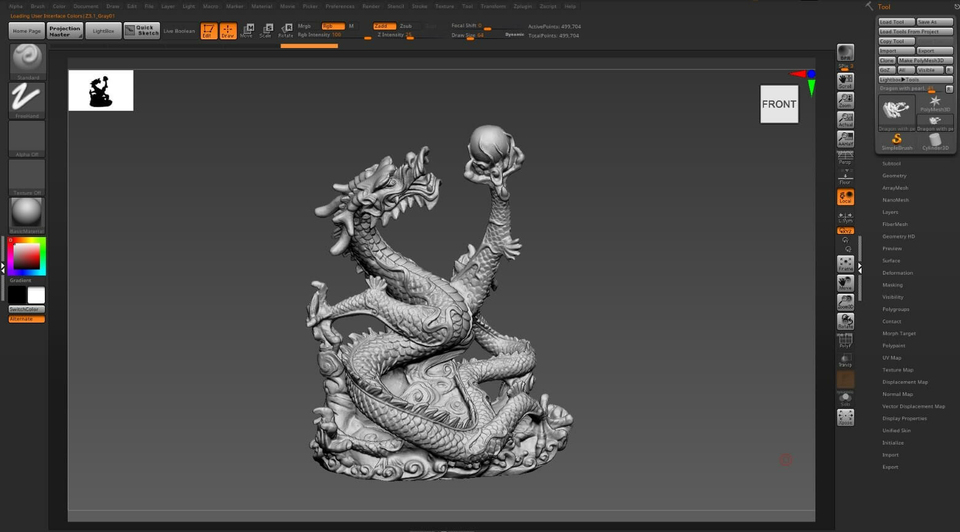
Now part of the Maxon portfolio, ZBrush is a one-of-a-kind 3D software for digital sculpting and painting. What makes this software stand apart from other 3D design tools is its special design technique that replicates traditional hand-sculpting. ZBrush is perfect if you want to design realistic and highly detailed 3D models using production-quality shading, lighting, and rendering outputs. For that very reason, the software is used by a wide array of creative professionals, including filmmakers, game developers, toy/collectible makers, jewelry designers, automotive/aviation designers, illustrators, advertisers, scientists, and other artists.
Advanced users turn to ZBrush for its photorealistic sculpts, natural and intuitive process, robust suite of tools, and real-time feedback. However, many new users find the software challenging and not the easiest to get started with – that’s why it’s best to turn to ZBrush when you already have solid experience with other poly modeling software. The good thing is, the software has one of the largest communities of artists who share lots of useful tips, techniques, and inspiration on a regular basis.
Artec Studio
Cost
US $1,700 /year or US $4,300 for lifetime license
OS
Windows
Pros
Professional capture & editing tools, seamless CAD export
Cons
Windows only
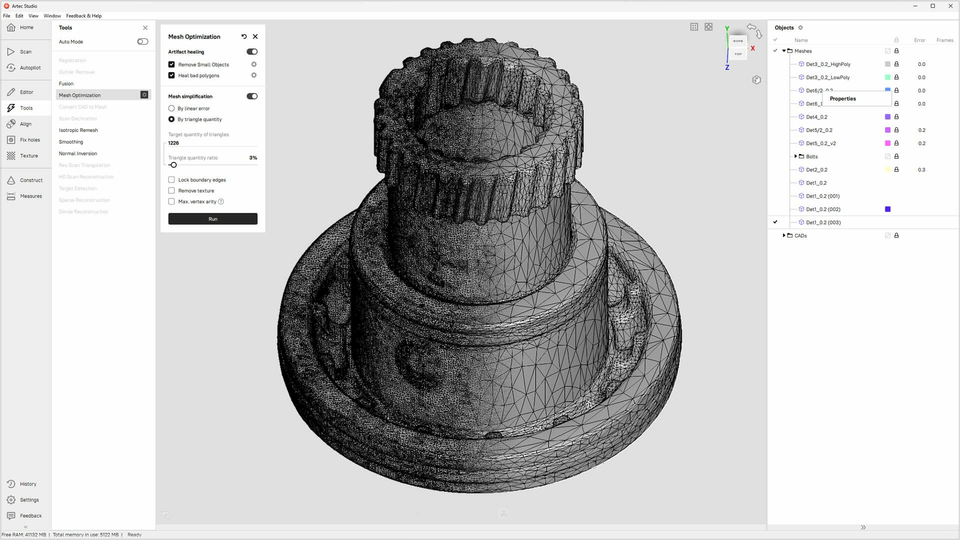
If your preferred method of 3D modeling is starting with a 3D scan of something from the real world, you should definitely give Artec Studio a go (paired with one of Artec 3D’s scanners, of course!). This powerful software suite for 3D scanning and data processing features advanced 3D data algorithms that make using Artec scanners rapid, accurate, and intuitive to use.
For new 3D scanning users, Artec Studio’s autopilot automatically chooses the right processing algorithms and settings to deliver the best possible results. Want to 3D model a massive object or area in high detail? Multi-resolution fusion allows multiple scans to be combined in a single click, so even complete novices can design with the best possible data straight away.
In addition to scan editing tools like hole repair, texture-filling, and scan decimation, more advanced users can also tidy up meshes with features like automatic glare removal. This automatically identifies which frames have glare by analyzing frames shot from different angles, and then takes them out of the calculation, resulting in uniform colored textures.
Another useful feature is dynamic auto-brightness, which automatically tailors brightness to an optimal level, both during scan preview and 3D data capture. Once processed in Artec Studio to form a final mesh, the model can be exported in any popular 3D format to other modeling software for further editing.
Artec Studio is available for Windows OS and can be purchased as a lifetime license, or an annual subscription. There is a trial version you can test for 30 days at no cost.
3DCoat
Cost
€379 lifetime for 1 computer
OS
Windows, macOS, Linux
Pros
Affordable, extensive retopology tools
Cons
Few tutorials and community support compared to other tools
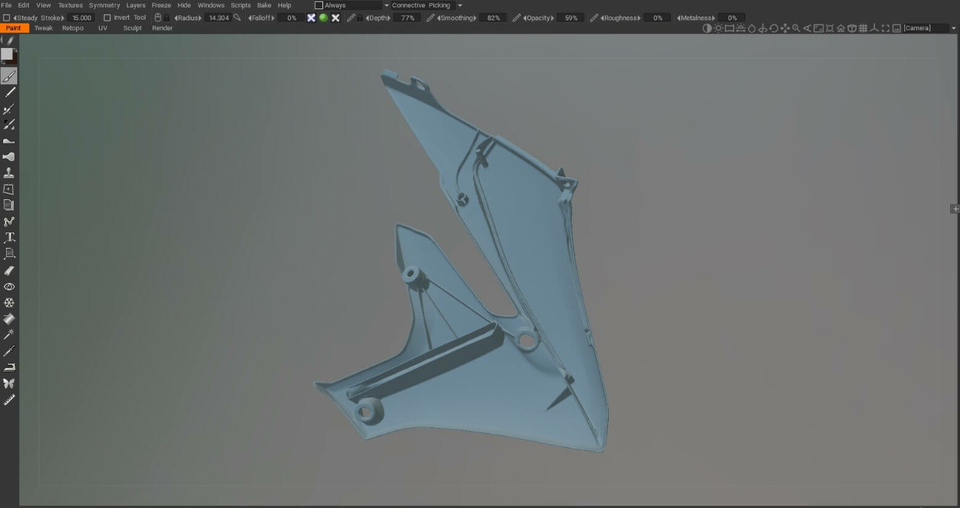
If you are looking for software where you can utilize both modeling methods (from scratch and with a 3D scanner), then 3DCoat is for you. This This sculpting, UV mapping, and texturing package comes in handy when you don’t just need to design something completely from scratch, but if – for example – you have a 3D model created with a scanner, and you want to edit the texture, create a fine-looking UV map, or retopologize the mesh. All that and much more is possible with 3DCoat.
3DCoat’s sculpting tools support both mesh and texture post-processing. This includes removing any defects or noise, as well as the retopologizing of high poly meshes or the extra sculpting and painting you would do in Photoshop. Plus, the program is quite affordable, especially if you have already invested in professional scanning hardware and software.
3DCoat comes with a lifetime commercial license and costs just €1 for universities, schools, and other educational organizations.
Geomagic Freeform
Cost
Basic license starting from US $7K one-time
OS
Windows
Pros
Comprehensive design and sculpting tools
Cons
Requires special drawing device
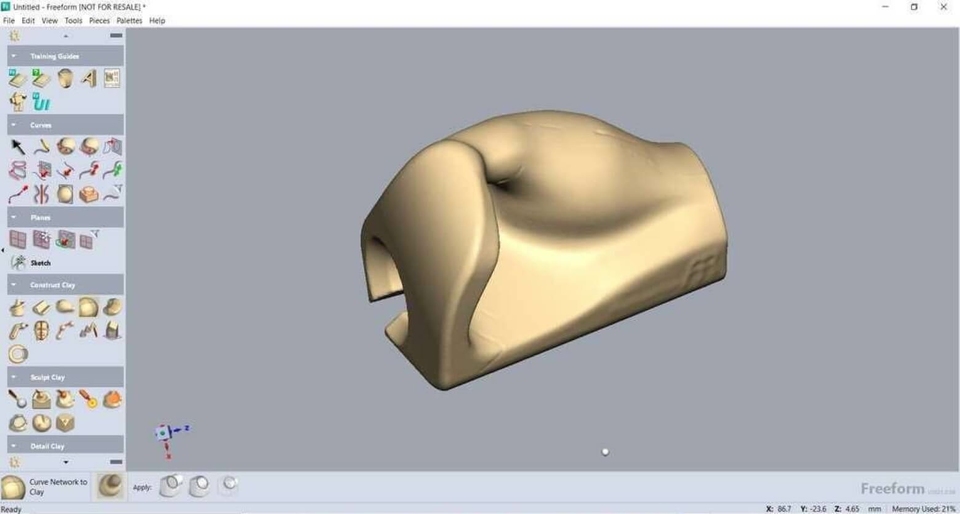
The last software on our list is Geomagic Freeform by 3D Systems – a multi-purpose 3D sculpting program for designing complex, organic shapes and preparing them for 3D printing, or mold and die manufacturing. What makes Freeform stand out from the crowd of other sculpting solutions is its hybrid workflow using 3D Systems’ special touch-based haptic devices (Touch or Touch X) which bring a user the real sensation of clay sculpting in a digital environment. This not only delivers freedom of motion for the user, but it also makes the design process more intuitive and effortless.
In addition, Geomagic Freeform supports the import of CAD and 3D scan data that can be further modified or combined with organically sculpted features, and prepared for production and printing. In fact, if you have an Artec 3D scanner, you can capture real-life objects in 3D directly within Freeform, then incorporate them into existing shapes and designs. Some advanced tools of Freeform include 3D data repair, automatic conversion of digital clay and polygons to NURBS surfaces, mold and die design, shelling, draft analysis, as well as parting line and surface creation tools for complex organic shapes. Such a mixture of functionality makes the software applicable for a wide range of fields including product design, CGI, healthcare, orthopedics, and many others.
Geomagic Freeform is now marketed by 3D Systems’ software subsidiary Oqton in the shape of free trial, professional, and Freeform Plus licenses, with pricing available on request.
Best free 3D modeling software
Blender
OS
Windows, macOS, Linux
Pros
Robust modeling toolset, large and developed community of users
Cons
UI can be overwhelming and difficult to learn
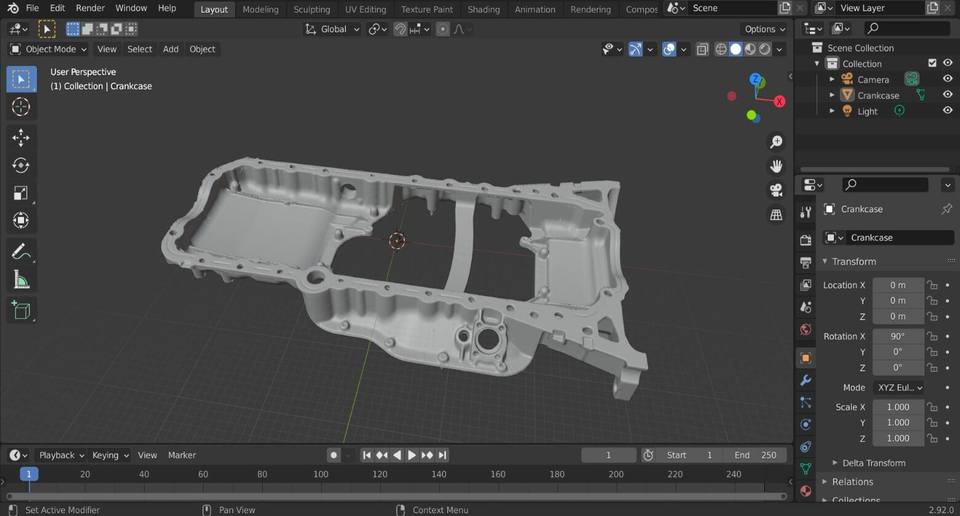
If you ask any 3D artist, whether a beginner or a pro, “What is the best free 3D modeling program out there?” you will likely hear the same answer: Blender. This free, open-source 3D creation suite is an ideal choice for those who want to see if 3D modeling is for them without needing to invest anything other than time. It’s also a great alternative to paid tools such as 3ds Max and Maya, as it has all that is necessary for modeling, rigging, animation, simulation, rendering, compositing, and motion tracking – even for video editing and game creation. It also has sculpting tools and while these are usually sold separately, Blender has them out of the box.
Blender supports 36 languages and is cross-platform, which makes it a super accessible yet powerful tool both for beginners and professionals, with an easy, flexible OpenGL-based interface and frequent updates. What Blender is also noted for is its vibrant community of users, where lots of useful and practical information for those who are just getting started in 3D modeling is shared.
Given the immense spectrum of tools and modules available, the biggest challenge that many new users have highlighted is that it can be overwhelming and difficult to start creating things with Blender. To be really fluent with the program, one has to spend time learning the shortcuts and watching lots of the community tutorials to get used to which features to use, and what for. As such, it requires some time (and patience) to master this all-round Swiss Army knife of 3D modeling.
Best free open-source 3D creation suite for those who want to see if 3D modeling is for them without needing to invest anything other than time.
Wings 3D
OS
Windows, macOS, Linux
Pros
User-friendly, wide range of selection and mesh tools
Cons
Animation is not supported
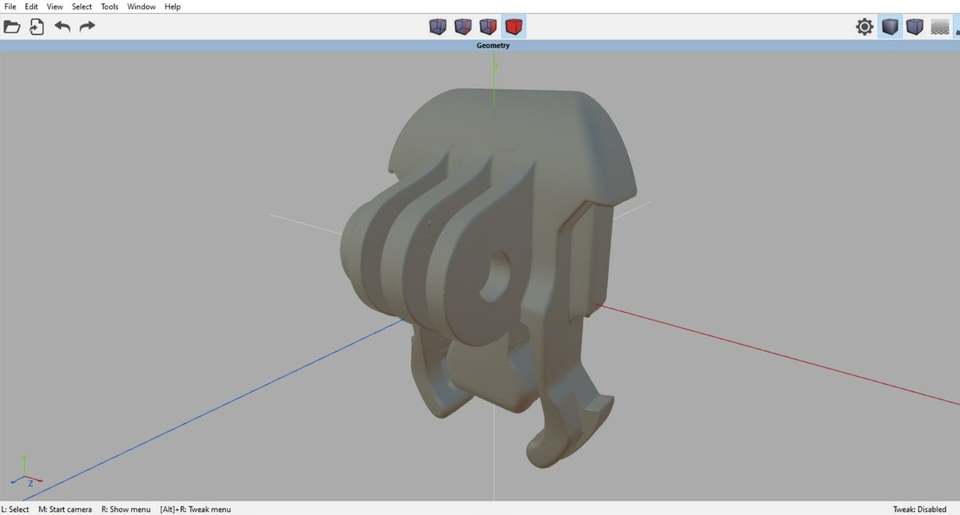
One more open-source 3D modeling freeware well-suited for beginners is Wings 3D. It provides all the basic modeling tools like move, scale, rotate, extrude, cut, weld, bevel, and bridge, as well as some of the more advanced tools like sweep, plane cut, intersect, inset, bend, circularize, and shear. The AutoUV tool allows you to map the textures to your models, and export them for painting and further texturing. There are also tweaking and sculpting capabilities for even more detailed modeling.
Like Blender, Wings 3D requires some time for you to learn all the ins and outs, and also has a developed community of users whom you can connect with to help accelerate your learning.
The program has been localized to 15 languages and can be downloaded for free.
Autodesk Fusion 360
OS
Windows, macOS
Pros
Easy repair of STL files, good basic 3D printing tools
Cons
Steep learning curve, not user-friendly UI
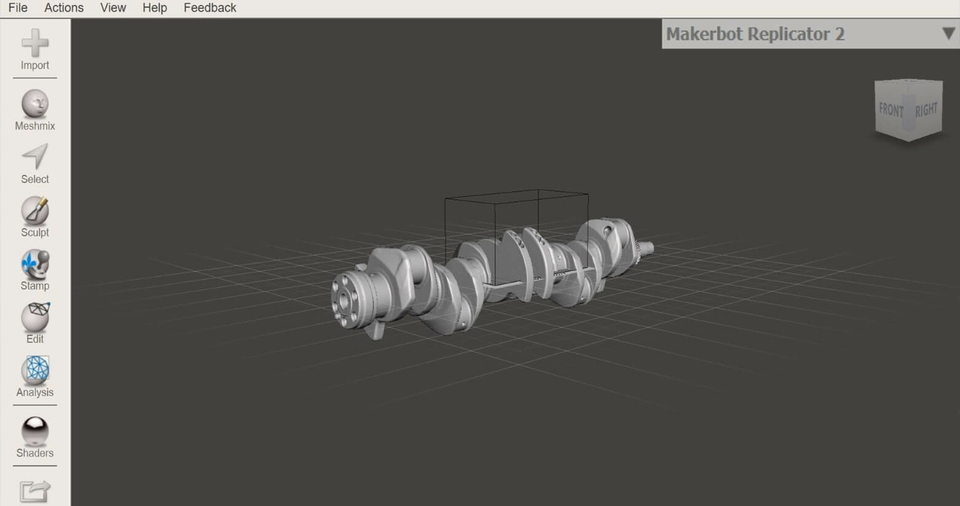
Not a 3D modeling software (or even a freeware) per se, Fusion 360 is an industry staple for makers and engineers needing to clean up a 3D scan, repair an existing STL file, or prepare a 3D model for printing. At its core, the program is built for design and iteration. This is reflected in a sketching and modeling toolset that allows for the creation and editing of complex parametric surfaces for geometry repair, patching, and more.
It does take some time and practice to learn how to work in Fusion 360. Some users find the interface slow and not particularly intuitive (though many also used the now-discontinued MeshMixer). But if you’re working on a hobby 3D project that you want to print or fix, Fusion 360 could be your tool. Especially if that fix is simple and can be carried out in the free trial.
If you want to access Fusion’s full suite of generative design, manufacturing, and simulation features, you will have to fork out for a $680 annual license. However there are enough essentials in the basic version to get a lot done, with many of the extras designed to address professional use cases.
Best 3D animation software
Some paid and free modeling software suites that we listed above, including 3dx Max, Maya, Blender, have comprehensive animation tools of their own. We recommend checking them out as well, especially if you are considering the software both for 3D modeling and animation. And here we’ve collected a few more 3D animation-focused tools for you to explore.
Houdini
Cost
Houdini FX – US $4,495/yr or US $6,995 one-time
Houdini Core – US $1,995/yr or US $2,995 one-time
Houdini Indie – US $269/yr
Houdini Apprentice – FREEOS
Windows, macOS, Linux
Pros
Powerful animation tools, VFX simulations, procedural workflow
Cons
Steep learning curve, technical, not for beginners
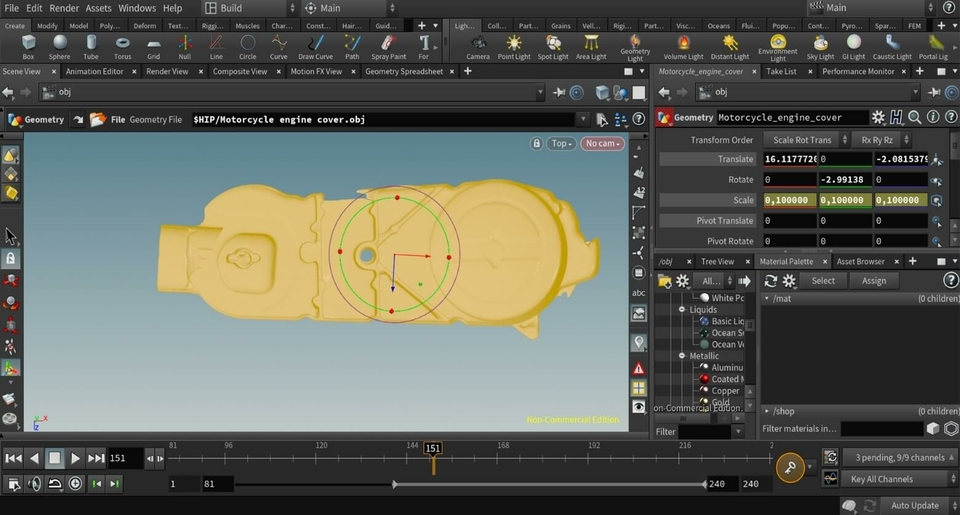
Houdini is a powerful 3D animation software most commonly used for the creation of visual effects in films, commercials, and video games. Developed by SideFX, the tool is popular among major VFX studios such as Walt Disney Animation Studios, Pixar, DreamWorks Animation, Sony Pictures Imageworks, ILM, and other heavyweights. What makes Houdini stand out from other 3D design software is its procedural node-based workflow, especially its procedurally generated fluids and particles that add an extra level of realism to animated scenes.
Houdini’s animator-friendly workflow includes a channel editor, dope sheet, and interactive timeline. You can set keyframes on any parameter, or use Houdini’s advanced motion-editing tools for greater control. Apart from animation, the software also supports a wide variety of polygon, NURBS and subdivision surface modeling tools, cloud FX tools, character rigging, lighting effects, rendering, and compositing. Professional VFX artists choose Houdini for its node-based way of working for easy, quick changes in the pipeline and ability to handle unique and complex 3D modeling projects.
The software has a very steep learning curve and requires a lot of technical knowledge to use it at its full potential, which makes it less suitable for novice 3D artists and animators. However, if your project is non-commercial, the developer offers a free limited version of its software called Houdini Apprentice.
Autodesk MotionBuilder
Cost
US $2,145/year
US $6,435/3-yearsOS
Windows, Linux
Pros
Fast learning curve, easy integration with the rest of the Autodesk suite, highly flexible performance capture ability
Cons
Not very user-friendly UI, not available for macOS
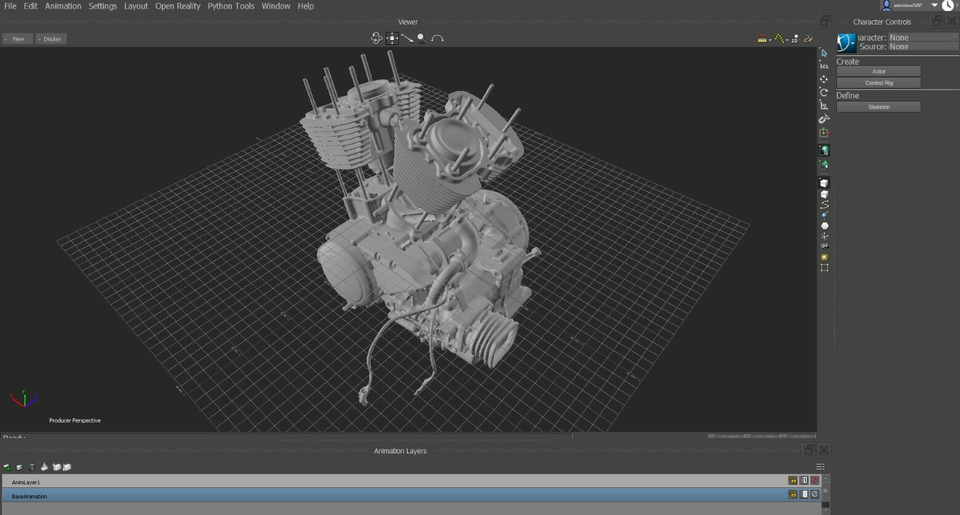
Another 3D software from Autodesk designed specifically for character animation is MotionBuilder. The software is used in film, games, television production, and other multimedia projects for virtual cinematography, motion capture, and traditional keyframe animation. It was the major pipeline solution for the Avatar movie, where it was used for capturing the actors’ performances and transferring them to 3D characters.
MotionBuilder features a real-time 3D engine that allows animators to create realistic character movements and run highly dense datasets in real time. It also features performance capture (rather than just motion capture) and allows artists to capture facial, body, and re-target stock motion clips, as well as to combine, trim, edit, and adjust curves and graphs, thus fine-tuning the animation to match the individual character's personality. The software also offers a software development kit and FBX data exchange for easy interoperability with other 3D applications.
Like other Autodesk 3D software suits, MotionBuilder comes with a yearly subscription and has a 30-day trial, so you can test out the software for free.
Cinema 4D
Cost
US $116/month
OS
Windows, macOS, Linux
Pros
Easy to use, intuitive UI, versatile
Cons
Relatively expensive
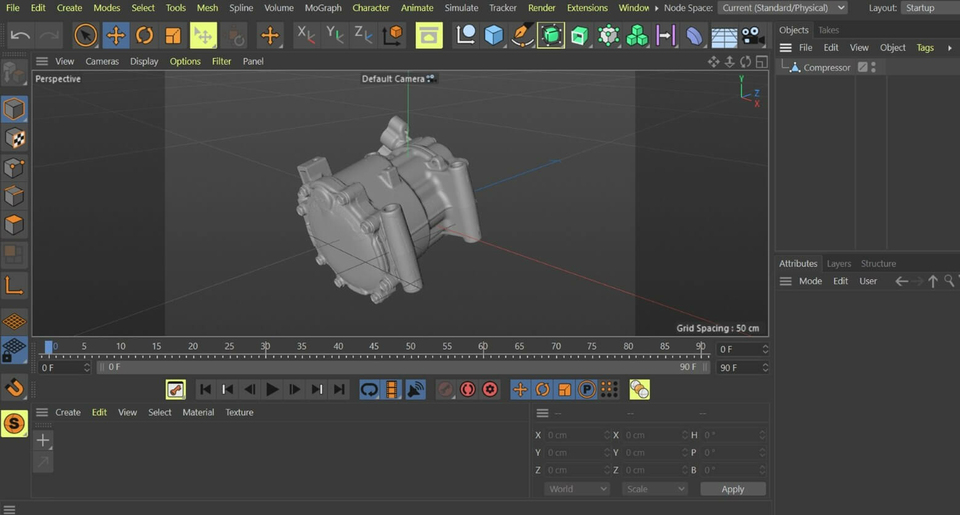
The last software on this list, and another killer multi-purpose software for professional 3D modeling, animation, simulation, and rendering, is Cinema 4D by Maxon. The software is widely used by computer graphics artists, designers, and animators for motion graphics, VFX, AR/MR/VR, design, game development, and all types of visualization.
Cinema 4D offers a wide range of advanced yet easy-to-use character animation tools and features to create life-like characters, as well as lots of rig presets to quicken your animation workflow. It also features MoGraph, an award-winning procedural modeling and animation toolset that provides motion designers with the ability to quickly and easily create complex and abstract animations. Professionals like Cinema 4D for its wide functionality and versatility, and amateurs – for its friendly, intuitive interface.
The software has a huge community of users and offers thousands of tutorials and how-tos on their training portal, as well as weekly and monthly webinars hosted by Maxon’s training team.
Cinema 4D is available both for perpetual use and by subscription, and has a free trial and lower-cost education license for teachers and students.
Multi-purpose animation software with a wide range of advanced yet easy-to-use character animation tools and features for creating life-like characters, as well as lots of rig presets to quicken your animation workflow.
Author
Was this article helpful?

